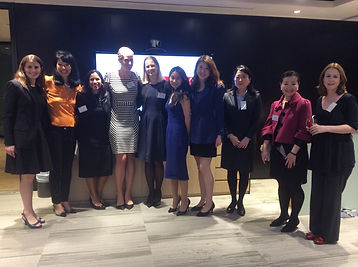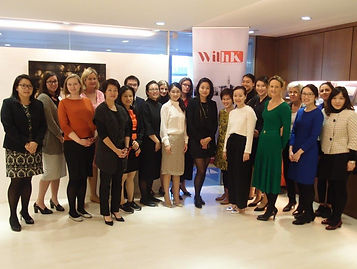About Us
Women in Law Hong Kong (WILHK) is a society providing private practice lawyers, in-house counsel and all other industry professionals a solutions-based approach to gender equity. WILHK is supported by many of Hong Kong’s leading firms and institutions and is one of the largest legal networks in Hong Kong. With over 1,500 members representing all genders, WILHK encourages a diverse exchange of ideas and collaboration.
WILHK engages with the legal community by providing:
-
Mentoring and networking opportunities for women in the legal profession;
-
Capacity building events and workshops to foster knowledge, skills and best practices;
-
A platform to discuss issues affecting women in the legal profession and practical solutions to overcome them;
-
Market research on relevant topics (e.g. unconscious bias, and flexible and agile working);
-
Developmental tools and leadership opportunities to encourage the promotion and retention of women in the legal profession.
WILHK has three core programmes namely Mentorship, Thought Leadership & Workplace Culture and Engagement & Wellbeing.
The Mentoring Programme is one of WILHK’s key initiatives and one of the only cross-firm and cross-business female mentorship programmes in the Hong Kong legal industry. Mentorship is crucial in advancing gender equity as research has found women benefit enormously both professionally and personally from an experienced senior mentor to help them gain access to opportunities and grow in an often still male-dominated business environment. WILHK’s Mentoring Programme which is now at its 6th year has been helpful in connecting women in the industry with mentors who they can seek inspiration and guidance from.
The Thought Leadership & Workplace Culture Programme includes exploring topical issues on gender equity, conducting Hong Kong legal industry specific gender related research and runs a Tone from the Top series featuring female senior leaders in the industry to showcase diverse female role models in the legal sector.
In 2019, before the pandemic, WILHK published the first-of-its-kind study on flexi agile working in the Hong Kong legal industry which studies the individual attitudes and structural biases preventing Hong Kong’s legal industry from adopting a better flexible and agile working model (link). The report heightened awareness that flexible and agile working results in more productive employees which benefits the bottom line and sheds light on the double burden that women experiences.
WILHK is also launching a report on 12 January 2023 on how everyday behaviour impacts on the retention of female talent in the HK legal industry.
WILHK also ran workshops on #metoo and bullying and harassment which as we understand from the International Bar Association’s publication in 2018, approximately one in two female and one in three male had been bullied, one in three female had been sexually harassed in a legal workplace context. At WILHK’s 4th anniversary, WILHK featured a fireside chat with Emily Steel, a New York Times journalist who exposed sexual harassment and misconduct across industries and was awarded a Pulitzer Prize for her work.
WILHK has also made submissions to the HKEx consultation on review of the corporate governance code covering a range of issues including gender diversity.
The Engagement and Wellbeing series includes industry outreach (collaborating with law firms, inhouse, chambers, other DEI networks and professional bodies etc.), well-being events and also Women@Lunch. Women@Lunch is a monthly lunch where members of the industry can discuss, exchange ideas, and gain awareness on gender issues over a casual lunch. It is designed to be a supportive environment as well as an informal networking session that is planned in a way that is mindful of a woman’s other commitments outside of work. WILHK has also during the pandemic launched the wellbeing series to help women restore their mental and physical strength and wellbeing as research has shown that women have been burned out more than ever during the pandemic.



